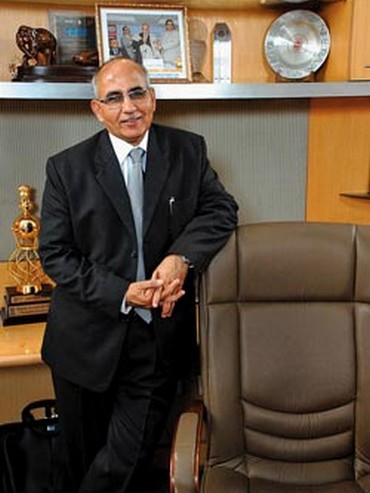 | « Back to article | Print this article |
'It's time to think beyond just numbers'
Amarjit Chopra, President, ICAI discusses what it means to be a Chartered Accountant, student issues and corruption.
For a man who spends his life with numbers, Amarjit Chopra's concerns such as corruption and the Chartered Accountant's (CA)'s role, go way beyond financial issues.
He attributes it to a childhood, which though tough, inculcated the right values in him. In a discussion with Mahesh Sarma, Chopra, President of The Institute of Chartered Accountants (ICAI) and a CA by qualification, discusses the challenges of the profession, student issues and corruption, amongst others.
Is it time CAs moved beyond just financial concerns and looked at what the balance sheet represents, as well as areas such as Corporate Social Responsibility?
ICAI must not concentrate only on accounting and auditing. We should also look into social issues. We are an elite class of only 168,000 in a population of more than 130 crores.
If we do not start thinking then who else will start thinking on education, environmental issues like green revolution, floods or corruption? And the kind of network we have we have clients, access to the bureaucracy also. I think it is high time we started thinking on these issues.
Would these issues become part of the CA curriculum?
As far as corporate responsibility is concerned, there is no doubt about it - probably it has to be part of the CA curriculum. For environmental audit it will definitely be a part of the curriculum. In those cases, for a beginning we can really bring those as topics for group discussions.
Probably, during the GMCS course i.e General Management Communication Skills which has duration of 14 days or three months, depending upon what students opts for.
Any concrete steps in that direction?
We would definitely like to. But first we need to create awareness particularly corruption is going to be one of the issues in every group discussion.
It's not about general corruption. I am talking of corruption and the role of the accountants. When I say role of accountants then it is not in relation to create corruption, but rather prevent corruption.
Should accountants restrict themselves to presenting the true and fair view?
We will have to move beyond just presenting the true and fair view. To a certain extent, it has happened in India but it has not happened world over.
I must compliment ICAI -- in India, there is a report called company auditor's report, which is not there anywhere else in the world. In this report -- there are 21 clauses, which talk of utilisation of funds, whether any frauds have been committed, diversion of funds etc. So in some sense the auditing profession is aware and alive to these challenges. But, remember that is not the auditors' job.
Our job is to ascertain if what the books reflect a company's true picture
What is the auditor's job?
Auditors are not supposed to look at the losses. They should only look at the data presented to them and ascertain if what the books reflect is true and a fair picture of the affairs of the company, based on documentary evidence. An auditor is not supposed to bother about losses incurred by the company though in practice they do.
Why is there an impression that CA is a very difficult exam to crack?
It cannot be an easy exam. Entry into any profession must be based on a certain level of rigour. Look at medicine, the IITs, in their case entry is exceptionally difficult. Hundreds of thousands of aspirants write the entrance examination, only a few thousands get through. The nature and diversity of the CA course does not permit that. So, here the entry is easier. But only the capable ones finally clear the course.
So what happens to those who cannot qualify?
Those who clear the IPCC, the first group of CA now earn the certification as Accounting Technicians. They could assist Chartered Accountants, work for small firms or units, which need basic book keeping support. We also have a tie-up with IGNOU for degree exemptions for CA students.
What is the policy of the Institute with respect to transfer of articled clerks?
The institution is not against transfer of articled assistants. Transfer policy must be sensible and fair to both sides.
An associate would seek a transfer primarily only if there is an element of incompatibility with his senior or if there is an issue about compensation work hours etc.
But all these would be known to both the parties within the first few months of working.
So the institute permits any number of transfers in the first year. But there shall be no transfer from the second year onwards, unless it is for an exceptional reason. What we do not stand for is the abuse of the system.
Be loyal to your customer
There was a proposal to double the stipend for students...
The council has already approved the doubling of stipends but the proposal is with the ministry concerned.
Unless the ministry approves it and issues the notification, we cannot officially effect a change. But we do attempt to ensure that they are paid their dues. In our own way we try to help them in the interim. We began by organising campus placement for them. We have also set up a national-level placement portal for their assistance.
Is campus placement a national project?
The Board of Studies organised a Campus Placement Programme for Articled Assistants in New Delhi as a pilot project, for two days in August 2010, to enable both firms of chartered accountants having their head office/ branch office in Delhi/ New Delhi as well as perspective articled assistants looking for vacancies to undergo articled training with firms of chartered accountants.
While our proposal to double the stipend is still pending with the ministry, we thought some of our talented youngsters might be able to earn a stipend, which is much beyond the mandated figure by the institute.
How successful was the programme?
Some 31 firms of chartered accountants and 148 candidates participated in the programme. All the 148 candidates were selected by the chartered accountants firms, based on the selection criteria devised by the firms.
Before I demit office in February, I would hope to have one more such even organised in the western region. In the long run, all major regions will also probably have their own campus placements.
How do you plan to make campus placements an all-India affair?
Yes, there is a need for that. We have taken up this issue through the Online Articles Placement Portal (www.bosapp.icai.org). This is to facilitate placement of Articles in CA Firms on a pan India basis.
The portal has been made operational from October 5, 2010. So far 369 CA firms and 724 candidates have been registered through portal and more than 450 candidates have already been selected for articles training.
Your advice to young CA aspirants
One has to be hard working, ethical, loyal to ones employer or customer and have family values. Success will come automatically.


